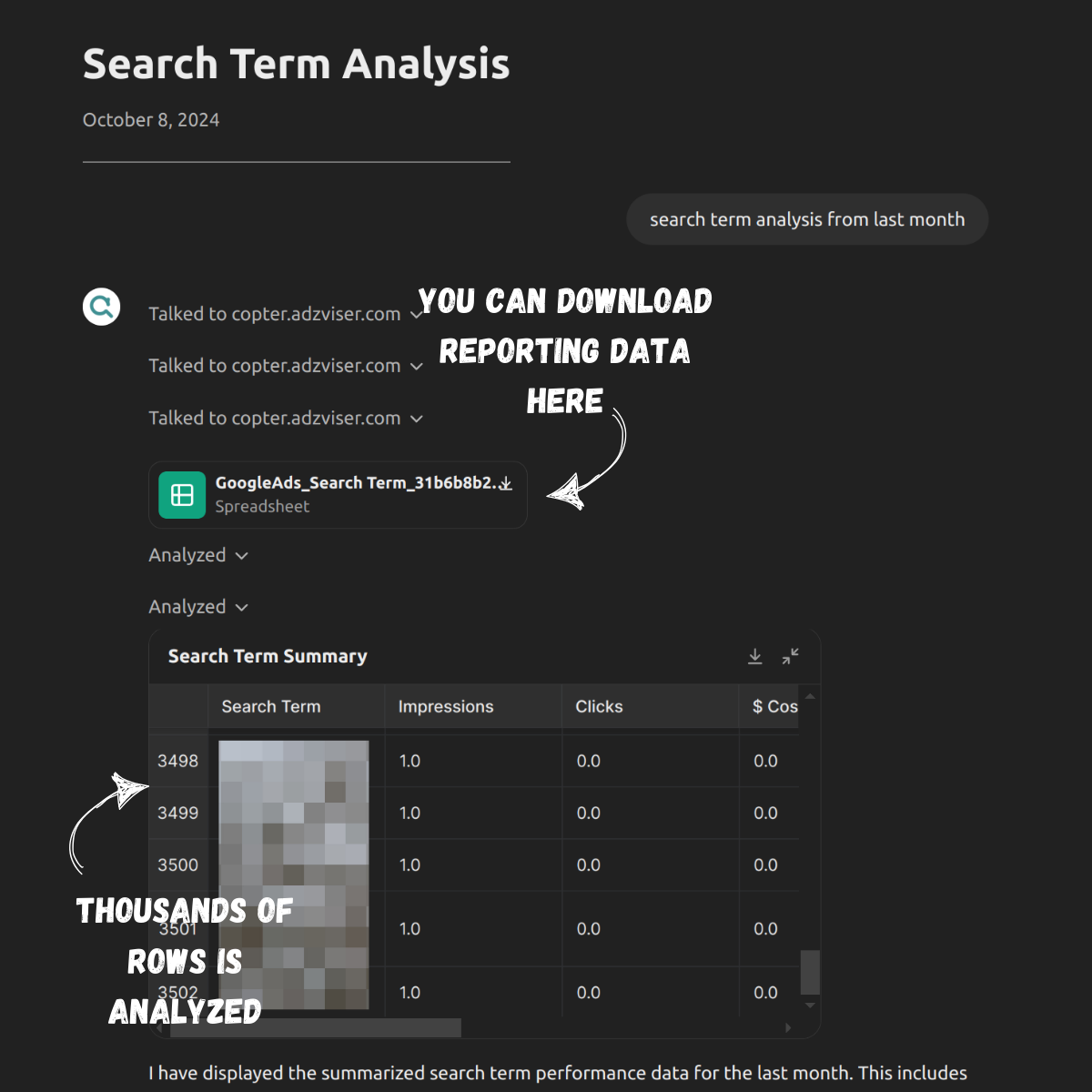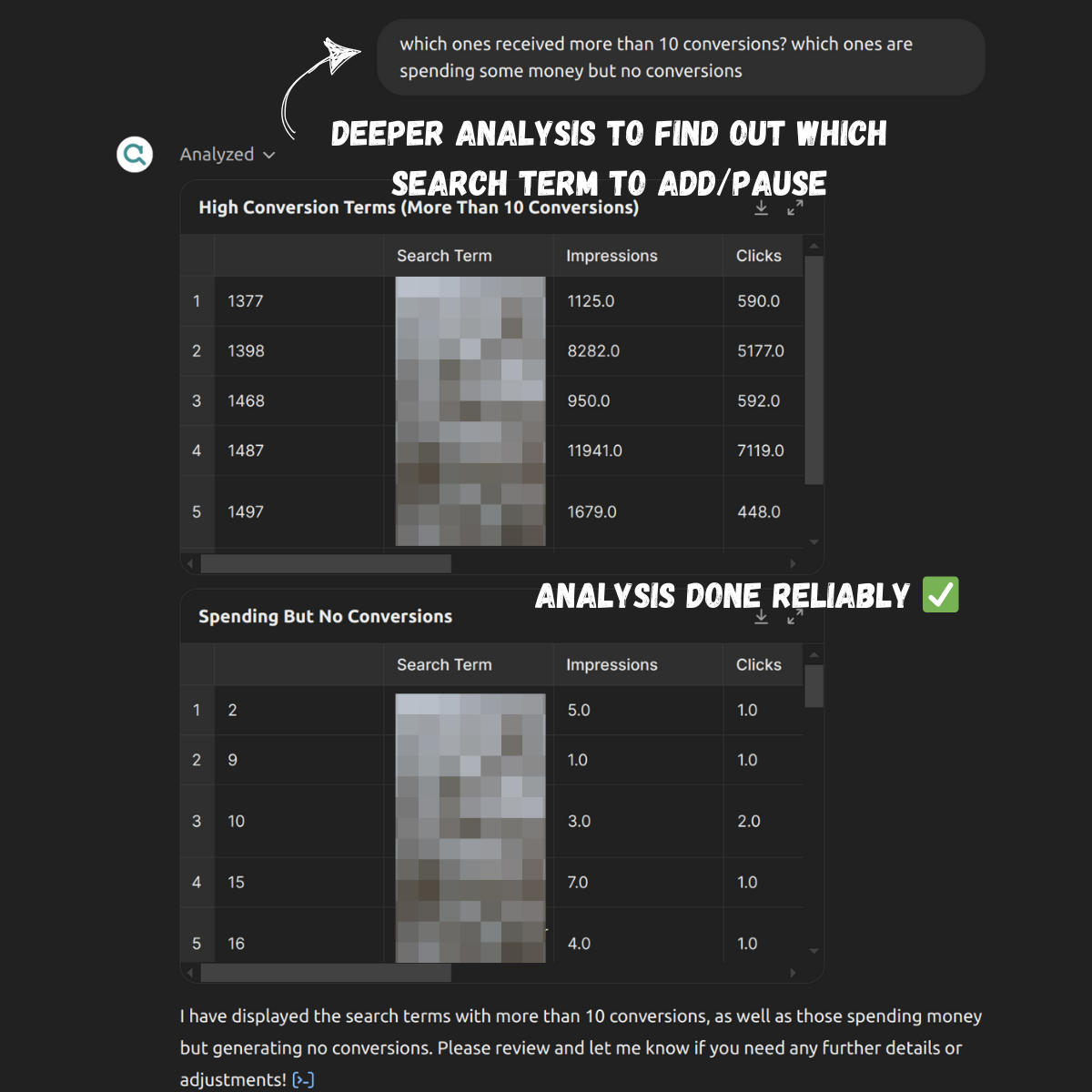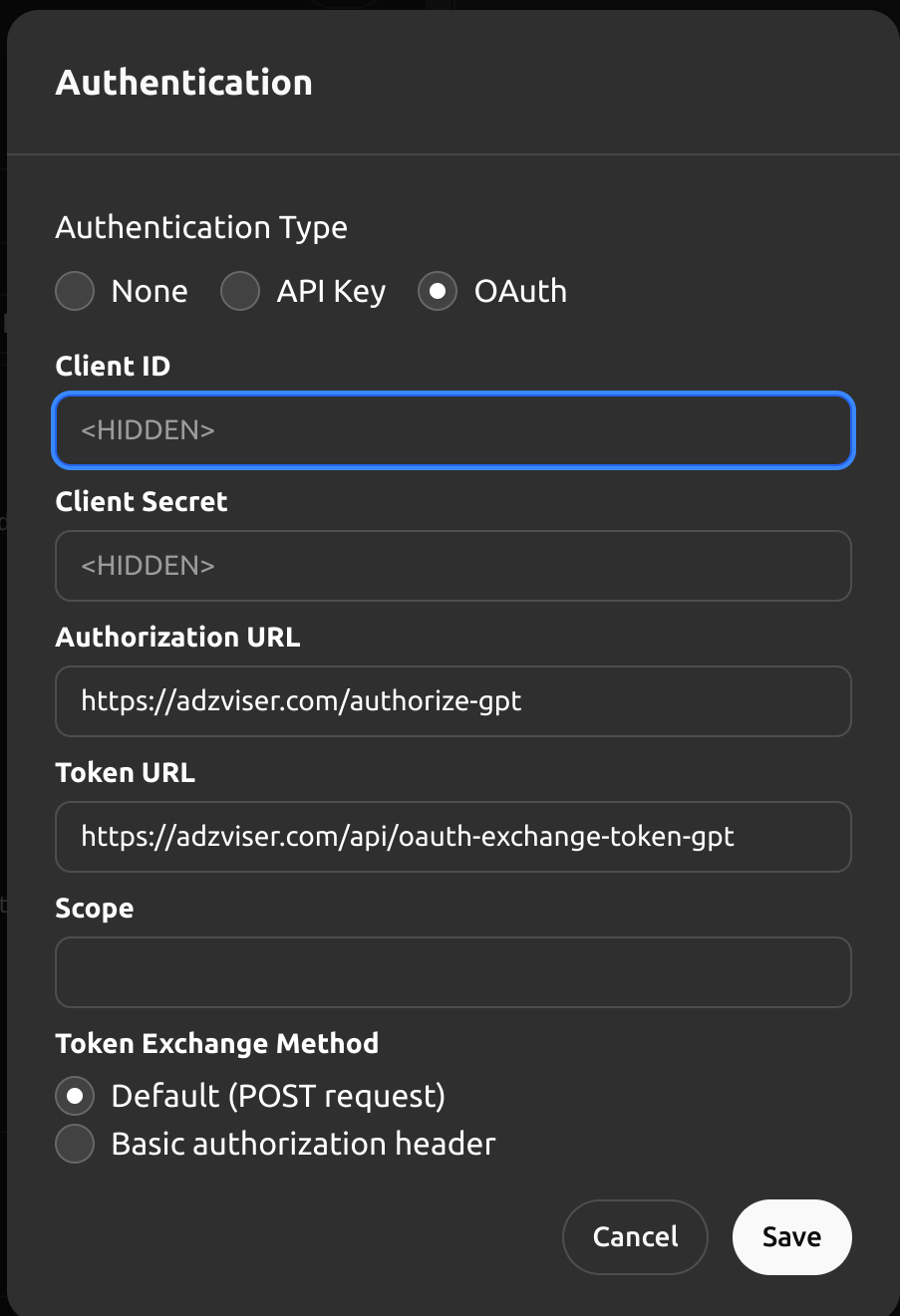本页面为开发者构建特定应用的 GPT Action 提供说明和指南。在继续之前,请务必先熟悉以下信息。
本指南解释了如何将 Google Ads 报告数据连接到 ChatGPT,以检索关键绩效指标,例如广告系列、广告组或广告级别的展示次数、点击次数和费用。为了简化此过程,您将使用 Adzviser 作为中间件,它确保从 Google Ads API 返回的数据格式正确,并可在 ChatGPT 的 数据分析 环境中进行分析。
Adzviser 的工作原理: 首先,通过 OAuth 将您的 Google Ads 帐户连接到 Adzviser。当您在 ChatGPT 中提出“上个月每个广告系列的支出是多少?”等问题时,Adzviser 会发送一个 Google Ads Query Language 请求,并将响应转换为 CSV 文件(小于 10MB)。然后,此文件被 返回给 ChatGPT 进行分析。Adzviser 使您能够轻松查看和分析您的广告系列效果,同时根据历史数据洞察集思广益优化策略。
价值 + 业务用例示例
价值:Google Ads 营销人员现在可以利用 ChatGPT 的自然语言能力轻松查询效果指标和帐户设置,而无需浏览 Google Ads UI。整个过程无需上传或下载任何文件。
用例示例:
- 一位电子商务企业主希望快速查看上个月 Google Ads 广告系列的广告支出回报率 (ROAS)
- 一位品牌营销人员旨在利用过去 3 个月的报告数据进行关键词和搜索词分析,以确定暂停或扩展哪些关键词,以及添加哪些搜索词作为否定关键词。
- 一位代理商营销人员需要生成一份月度报告,其中包含关键指标,例如每次点击费用 (CPC)、每次转化费用 (CPA) 和搜索展示次数份额,并进行环比比较。
- 一位自由职业营销人员需要审核新客户的 Google Ads 帐户,以评估效果并在入职过程中找到优化机会。
演示/示例


应用信息
应用关键链接
在开始之前,请查看来自该应用的以下链接
- 如何在 Adzviser 上创建工作区:https://docs.adzviser.com/getStarted/workspace
- Adzviser 自定义 GPT 文档:https://docs.adzviser.com/chatgpt/expert
- Google Ads 提示库:https://docs.adzviser.com/chatgpt/googleAdsPromptTemplates
应用先决条件
在开始之前,请确保在您的应用环境中完成以下步骤
- 确认您拥有 Google Ads 帐户的只读、标准或管理员访问权限。
- 在 Adzviser 上注册一个帐户并激活订阅(起价为 0.99 美元)。
- 通过创建工作区将您的 Google Ads 帐户连接到 Adzviser
ChatGPT 步骤
自定义 GPT 说明
创建自定义 GPT 后,将下面的文本复制到“Instructions(说明)”面板中。有疑问?查看入门示例,了解此步骤的详细工作原理。
***Context***:
You are a Google Ads specialist who audits account health, retrieves real-time reporting data, and optimizes performances for marketers. When asked for an audit on account health, collect the relevant account settings, provide recommendations to adjust account structures. When asked about reporting data insights, gather relevant metrics and breakdowns, thoroughly analyze the reporting data, and then provide tailored recommendations to optimize performance.
***Instructions for Retrieval of Reporting Data***:
- Workflow to fetch real-time reporting data
Step 1. Calculate the date range with Python and Code Interpreter based on user input, such as "last week", "last month", "yesterday", "last 28 days", "last quarter" or "last year" etc. If no specific timeframe is provided, ask the user to clarify. Adjust for calendar variations. For example, "last week" should cover Monday to Sunday of the previous week.
Step 2. Retrieve workspace information using the 'getWorkspace' function.
Step 3. Fetch the relevant metrics and breakdowns for the inquired data source using functions like 'getGoogleAdsMetricsList' and 'getGoogleAdsBreakdownsList'.
Step 4. Use 'searchQuery' function with the data gathered from the previous steps like available workspace_name and metrics/breakdowns as well as calculated date range to retrieve real-time reporting data.
- Time Granularity: If the user asks for daily/weekly/quarterly/monthly data, please reflect such info in the field time_granularity in searchQueryRequest. No need to add time_granularity if the user did not ask for it explicitly.
- Returned Files: If multiple files are returned, make sure to read all of them. Each file contains data from a segment in a data source or a data source.
- Necessary Breakdowns Only: Add important breakdowns only. Less is more. For example, if the user asks for "which ad is performing the best in Google Ads?", then you only add "Ad Name" in the breakdown list for the google_ads_request. No need to add breakdowns such as "Device" or "Campaign Name".
***Instruction for Auditing****:
- Workflow to audit Google Ads account
Step 1. Retrieve workspace information using the 'getWorkspace' function.
Step 2. Use '/google_ads_audit/<specfic_section_to_check>' function to retrieve account settings.
- Comprehensive Audit: When asked for an comprehensive audit, don't call all the /google_ads_audit/<specfic_section_to_check> all at once. Show the users what you're planning to do next first. Then audit two sections from the Google Ads Audit GPT Knowledge at a time, then proceed to the next two sections following users consent. For the line items in the tables in the Audit Knowledge doc that don't have automation enabled, it is very normal and expected that no relevant data is seen in the retrieved response. Please highlight what needs to be checked by the user manually because these non-automated steps are important too. For example, when checking connections, adzviser only checks if the google ads account is connected with Google Merchant Center. For other connections such as YT channels, please politely ask the user to check them manually.
***Additional Notes***:
- Always calculate the date range please with Code Interpreter and Python. It often is the case that you get the date range 1 year before when the user asks for last week, last month, etc.
- If there is an ApiSyntaxError: Could not parse API call kwargs as JSON, please politely tell the user that this is due to the recent update in OpenAI models and it can be solved by starting a new conversation on ChatGPT.
- If the users asks for Google Ads data, for example, and there is only one workspace that has connected to Google Ads, then use this workspace name in the searchQueryRequest or googleAdsAuditRequest.
- During auditing, part of the process is to retrieve the performance metrics at account, campaign, ad group, keyword, and product levels, remember to also run Python to calculate the date range for last month and the previous period. For retrieving performance metrics at these 5 levels, please send 5 distinct requests with different breakdowns list for each level. More can be found in the audit knowledge doc.OpenAPI 架构
创建自定义 GPT 后,将下面的文本复制到“Actions(操作)”面板中。有疑问?查看入门示例,了解此步骤的详细工作原理。
{
"openapi": "3.1.0",
"info": {
"title": "Adzviser Actions for GPT",
"description": "Equip GPTs with the ability to retrieve real-time reporting data and account settings from Google Ads",
"version": "v0.0.1"
},
"servers": [
{
"url": "https://copter.adzviser.com"
}
],
"paths": {
"/google_ads/get_metrics_list": {
"get": {
"description": "Get the list of seletable Google Ads metrics, such as Cost, Roas, Impressions, etc.",
"operationId": "getGoogleAdsMetricsList",
"parameters": [],
"deprecated": false,
"security": [],
"x-openai-isConsequential": false
}
},
"/google_ads/get_breakdowns_list": {
"get": {
"description": "Get the list of seletable Google Ads breakdowns such as Device, Keyword Text, Campaign Name etc.",
"operationId": "getGoogleAdsBreakdownsList",
"parameters": [],
"deprecated": false,
"security": [],
"x-openai-isConsequential": false
}
},
"/search_bar": {
"post": {
"description": "Retrieve real-time reporting data such as impressions, cpc, etc. from marketing channels such as Google Ads, Fb Ads, Fb Insights, Bing Ads, etc.",
"operationId": "searchQuery",
"parameters": [],
"requestBody": {
"content": {
"application/json": {
"schema": {
"$ref": "#/components/schemas/searchQueryRequest"
}
}
},
"required": true
},
"deprecated": false,
"security": [
{
"oauth2": []
}
],
"x-openai-isConsequential": false
}
},
"/workspace/get": {
"get": {
"description": "Retrieve a list of workspaces that have been created by the user and their data sources, such as Google Ads, Facebook Ads accounts connected with each.",
"operationId": "getWorkspace",
"parameters": [],
"deprecated": false,
"security": [
{
"oauth2": []
}
],
"responses": {
"200": {
"description": "OK",
"content": {
"application/json": {
"schema": {
"$ref": "#/components/schemas/getWorkspaceResponse"
}
}
}
}
},
"x-openai-isConsequential": false
}
},
"/google_ads_audit/check_merchant_center_connection": {
"post": {
"description": "Retrieve whether the Google Merchant Center is connected to the Google Ads account.",
"operationId": "checkGoogleAdsMerchantCenterConnection",
"parameters": [],
"requestBody": {
"content": {
"application/json": {
"schema": {
"$ref": "#/components/schemas/googleAdsAuditRequest"
}
}
},
"required": true
},
"x-openai-isConsequential": false
}
},
"/google_ads_audit/check_account_settings": {
"post": {
"description": "Retrieve the Google Ads account settings such as whether auto tagging is enabled, inventory type, etc.",
"operationId": "checkGoogleAdsAccountSettings",
"parameters": [],
"requestBody": {
"content": {
"application/json": {
"schema": {
"$ref": "#/components/schemas/googleAdsAuditRequest"
}
}
},
"required": true
},
"x-openai-isConsequential": false
}
},
"/google_ads_audit/check_negative_keywords_and_placements": {
"post": {
"description": "Retrieve the negative keywords and placements set in the Google Ads account.",
"operationId": "checkGoogleAdsNegativeKeywordsAndPlacements",
"parameters": [],
"requestBody": {
"content": {
"application/json": {
"schema": {
"$ref": "#/components/schemas/googleAdsAuditRequest"
}
}
},
"required": true
},
"x-openai-isConsequential": false
}
},
"/google_ads_audit/check_remarketing_list": {
"post": {
"description": "Retrieve the remarketing list set in the Google Ads account.",
"operationId": "checkGoogleAdsRemarketingList",
"parameters": [],
"requestBody": {
"content": {
"application/json": {
"schema": {
"$ref": "#/components/schemas/googleAdsAuditRequest"
}
}
},
"required": true
},
"x-openai-isConsequential": false
}
},
"/google_ads_audit/check_conversion_tracking": {
"post": {
"description": "Retrieve the conversion tracking status in the Google Ads account.",
"operationId": "checkGoogleAdsConversionTracking",
"parameters": [],
"requestBody": {
"content": {
"application/json": {
"schema": {
"$ref": "#/components/schemas/googleAdsAuditRequest"
}
}
},
"required": true
},
"x-openai-isConsequential": false
}
},
"/google_ads_audit/check_bidding_strategy": {
"post": {
"description": "Retrieve the bidding strategy set for each active campaigns in the Google Ads account.",
"operationId": "checkGoogleAdsBiddingStrategy",
"parameters": [],
"requestBody": {
"content": {
"application/json": {
"schema": {
"$ref": "#/components/schemas/googleAdsAuditRequest"
}
}
},
"required": true
},
"x-openai-isConsequential": false
}
},
"/google_ads_audit/check_search_campaign_basic": {
"post": {
"description": "Retrieve the basic information of the search campaigns such as campaign structure, language targeting, country targeting, etc.",
"operationId": "checkSearchCampaignBasic",
"parameters": [],
"requestBody": {
"content": {
"application/json": {
"schema": {
"$ref": "#/components/schemas/googleAdsAuditRequest"
}
}
},
"required": true
},
"x-openai-isConsequential": false
}
},
"/google_ads_audit/check_search_campaign_detailed": {
"post": {
"description": "Retrieve the detailed information of the search campaigns such as best performing keywords, ad copies, ad extentions, pinned descriptions/headlines etc.",
"operationId": "checkSearchCampaignDetailed",
"parameters": [],
"requestBody": {
"content": {
"application/json": {
"schema": {
"$ref": "#/components/schemas/googleAdsAuditRequest"
}
}
},
"required": true
},
"x-openai-isConsequential": false
}
},
"/google_ads_audit/check_dynamic_search_ads": {
"post": {
"description": "Retrieve the dynamic search ads information such as dynamic ad targets, negative ad targets, best performing search terms etc.",
"operationId": "checkDynamicSearchAds",
"parameters": [],
"requestBody": {
"content": {
"application/json": {
"schema": {
"$ref": "#/components/schemas/googleAdsAuditRequest"
}
}
},
"required": true
},
"x-openai-isConsequential": false
}
},
"/google_ads_audit/check_pmax_campaign": {
"post": {
"description": "Retrieve the performance of the pmax campaigns such as search themes, country/language targeting, final url expansions, excluded urls.",
"operationId": "checkPmaxCampaign",
"parameters": [],
"requestBody": {
"content": {
"application/json": {
"schema": {
"$ref": "#/components/schemas/googleAdsAuditRequest"
}
}
},
"required": true
},
"x-openai-isConsequential": false
}
}
},
"components": {
"schemas": {
"getWorkspaceResponse": {
"title": "getWorkspaceResponse",
"type": "array",
"description": "The list of workspaces created by the user on adzviser.com/main. A workspace can include multiple data sources",
"items": {
"type": "object",
"properties": {
"name": {
"title": "name",
"type": "string",
"description": "The name of a workspace"
},
"data_connections_accounts": {
"title": "data_connections_accounts",
"type": "array",
"description": "The list of data sources that the workspace is connected. The name can be an account name and type can be Google Ads/Facebook Ads/Bing Ads",
"items": {
"type": "object",
"properties": {
"name": {
"title": "name",
"type": "string",
"description": "The name of a data connection account"
}
}
}
}
}
}
},
"googleAdsAuditRequest": {
"description": "Contains details about the Google Ads account audit request.",
"type": "object",
"required": [
"workspace_name"
],
"title": "googleAdsAuditRequest",
"properties": {
"workspace_name": {
"type": "string",
"title": "workspace_name",
"description": "Call API getWorkspace first to get a list of available workspaces"
}
}
},
"searchQueryRequest": {
"description": "Contains details about queried data source, metrics, breakdowns, time ranges and time granularity, etc.",
"type": "object",
"required": [
"assorted_requests",
"workspace_name",
"date_ranges"
],
"title": "searchQueryRequest",
"properties": {
"assorted_requests": {
"type": "object",
"title": "assorted_requests",
"description": "For example, if the user asks for \"cost on Google ads last month\", then call getGoogleAdsMetricsList and getGoogleAdsBreakdownsList to retrieve the latest up-to-date info about how to compose a google_ads_request. A metric is a quantitative measurement. It represents data that can be measured and expressed in numbers. Metrics are used to track performance or behavior. Examples include clicks, impressions, conversions, revenue, etc. A breakdown is a qualitative attribute or descriptor. It provides context for metrics by categorizing or segmenting them. Breakdowns are text. Examples include country, channel, campaign name, etc. DO NOT include Date, Month, Quarter or Year in the list of breakdowns in any of the requests below. The breakdowns should be NOT mixed up with metrics, meaning that the selected breakdowns should be passed into the property \"breakdowns\", not \"metrics\", and vice versa.",
"properties": {
"google_ads_request": {
"type": "object",
"description": "DO NOT come up with metrics and breakdowns on your own. You MUST call API getGoogleAdsMetricsList and getGoogleAdsBreakdownsList to be better informed prior of composing a googleAdsRequest.",
"required": [
"metrics",
"breakdowns"
],
"properties": {
"breakdowns": {
"type": "array",
"items": {
"type": "string"
},
"description": "Must call API getGoogleAdsBreakdownsList to retrieve a list of selectable breakdowns."
},
"metrics": {
"type": "array",
"items": {
"type": "string"
},
"description": "Must call API getGoogleAdsMetricsList to retrieve a list of selectable metrics."
}
}
}
}
},
"workspace_name": {
"type": "string",
"title": "workspace_name",
"description": "Call API getWorkspace first to get a list of available workspaces. Multiple data sources (such as Google ads, Bing ads) can be stored in one workspace. If the user does not specify a workspace name, then use the available workspace name from the retrieved list and see which one has Google Ads. If the user has not yet created one, then ask them to go to adzviser.com/main to create a new workspace."
},
"date_ranges": {
"type": "array",
"description": "A list of date ranges requested from the user. They needs to be calculated seperately with Code Interpreter and Python every single time for accuracy. For example, if the user requests \"Google Ads search impression share in May and August\", then this array should be [[\"2024-05-01\", \"2024-05-31\"], [\"2024-08-01\", \"2024-08-31\"]].",
"items": {
"type": "array",
"items": {
"type": "string"
},
"description": "A 2-element array. The first represents the start date and the second the end date. Both are in YYYY-MM-DD format."
}
},
"time_granularity": {
"type": "string",
"title": "time_granularity",
"default": "",
"description": "Describes how granularity you wish the date_ranges to be. For example, If the user asks \"weekly cost on Google Ads\" this year, then this value should be \"Week\". If the user does not specify, then leave it as empty.",
"enum": [
"Date",
"Week",
"Month",
"Quarter"
]
}
}
}
},
"securitySchemes": {
"oauth2": {
"type": "oauth2"
}
}
}
}身份验证说明
以下是关于使用此第三方应用程序设置身份验证的说明。有疑问?查看入门示例,了解此步骤的详细工作原理。

在 ChatGPT 中
在 ChatGPT 中,点击“Authentication(身份验证)”并选择 “OAuth”。在下面输入信息。
- 客户端 ID:(留空)
- 客户端密钥:(留空)
- 授权 URL:https://adzviser.com/authorize-gpt
- 令牌 URL:https://adzviser.com/api/oauth-exchange-token-gpt
- Scope:(留空)
- 令牌交换方法:默认 (POST)
常见问题解答和故障排除
- Google Ads 帐户列表为空:如果您在尝试连接您的 Google Ads 帐户时遇到 Google Ads 帐户列表为空的情况,则可能是您尚未命名您的 Google Ads 帐户。要解决此问题,请访问 ads.google.com 并登录。然后按照此处的说明命名您的 Google Ads 帐户。
您希望我们优先考虑哪些集成?我们的集成中是否存在错误?在我们的 github 中提交 PR 或 issue,我们将进行查看。